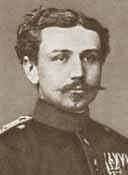|
Alexander
Heinrich Rudolf von Kluck
(20.05.1846 - 19.10.1934)
place of birth: Münster,
Westfalen (Westphalian Prussia)
Königreich
Preußen: Gen-Insp, OBH, Generaloberst
As commander of the
First Army during the first year of the Great War,
this Prussian (Westphalian) Generaloberst was also responsible for the
three northern flank armies tasked with thrusting through Belgium and
sweeping through northern France to encircle Paris. His forces defeated
the retreating British at Mons and then again at Le
Cateau and Maubeuge, freeing up a path
for the Germans all the way to the French capital. Von Kluck was
apparently a pleasant and courteous man in private life, but earned a
reputation for sub-human brutality in his professional career, thus
making him hated and feared by his subordinates.
The questionable decision making
process at German High Command and among the northern tier field army
commanders leading up to the Battle of the First Marne
is a matter of historical debate. Nevertheless, as his First Army force
pushed southward toward Paris, von Kluck mistakenly let them drift east
of the city instead of encircling to the west as according to the von Schlieffen
Plan. During the battle, allied forces were able to halt the
German onslaught approximately 13 miles from the outskirts of Paris.
Quick and intelligent action by von Kluck's reserve corps commander von
Gronau saved the First Army from becoming encircled themselves and
sparked what would become known as the "race to the sea."
General von Kluck and his Second Army counterpart von Bülow
bore the brunt of the blame for this disaster, but Kluck himself always
maintained that German intelligence chief Richard Hentsch had robbed
the Germans of a decisive victory when he traveled to the front and
ordered a general retreat.
|

|
| |
| Premier-Lieutenant
- 1872 |
Alexander von Kluck was born in Westphalia
as the fifth of six sons (and two daughters) to Betty
and Rudolf Kluck, the director of the state building and planning
office. Alexander began his military service as a lieutenant during the
campaign of 1866, fighting at Dermbach and Kissingen
under General von Göben. He
later saw action as a company commander in the 1870-71 war against
France, twice receiving wounds at the battle at Colombey.
For his bravery during this action, he was awarded the Iron Cross. He
also remained in France until 1873 as part of Germany's occupational
forces.
Upon returning from France, von Kluck got on
with his career, spending several years as a military
instructor and administrator at officer schools in Jülich,
Annaburg, and Neubreisach. He received his first regimental command in
1898 in Bromberg, and in 1899 was at last promoted to the general rank.
As a general of infantry and commander of I. Army Corps, he also
received his title of nobility in 1909.
Despite the 1914 disaster on the Marne, von
Kluck nonetheless later received from the Kaiser himself the order of
the Pour le Merite as he lie on his sickbed. He had
received a severe shrapnel wound in his leg while inspecting
his front lines. Known to be a very arrogant and unapproachable general
officer, he was the only German commander during war who had never
served on the Great General Staff or attended the Prussian War Academy.
Von Kluck retired from military service in early 1916 and died on 19
October 1934 in Berlin. He is buried at the Südwestkirchhof in
Stahnsdorf. Von Kluck's son Leutnant zur See Egon von Kluck was killed
in action on 28 January 1915 at Lombardsijde.
|